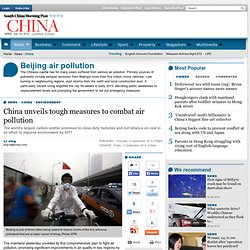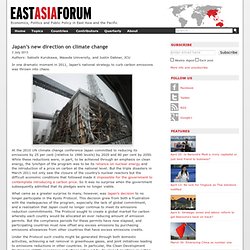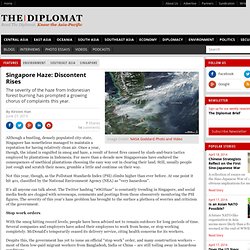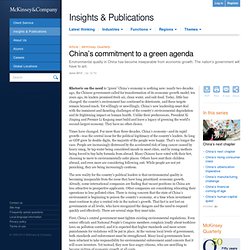

China vows air pollution cuts in major cities. The mainland yesterday unveiled its first comprehensive plan to fight air pollution, promising significant improvements in air quality in key regions by 2017.

The measures announced by the world's largest carbon emitter include closing down polluting factories, improving fuel quality and reducing overreliance on coal. Three major city clusters around Beijing, Shanghai and Guangzhou have been told to reduce levels of PM2.5 - the tiny airborne pollutants most harmful to human health and a major cause of smog - by 25, 20 and 15 per cent respectively between 2013 and 2017, according to the plan issued by the State Council. Beijing, which was shrouded in thick smog for months last winter, has a specific goal to limit its yearly average of PM2.5 to around 60mg per cubic metre by 2017. This is still well above the national standard of 35, and the safe limit of 10 recommended by the World Health Organisation. Japan’s new direction on climate change. Authors: Satoshi Kurokawa, Waseda University, and Justin Dabner, JCU In one dramatic moment in 2011, Japan’s national strategy to curb carbon emissions was thrown into chaos.

At the 2010 UN climate change conference Japan committed to reducing its emissions by 25 per cent (relative to 1990 levels) by 2020 and 80 per cent by 2050. While these reductions were, in part, to be achieved through an emphasis on clean energy, the lynchpin of the program was to be its reliance on nuclear energy and the introduction of a price on carbon at the national level. But the triple disasters in March 2011 not only saw the closure of the country’s nuclear reactors but the difficult economic conditions that followed made it impossible for the government to contemplate introducing a carbon price. So it was no surprise when the government subsequently admitted that its pledges were no longer viable. The CDM has been the subject of criticism. Extra-territorial laws on haze being considered: Shanmugam. Singapore is looking at introducing extra-territorial laws to penalise companies found responsible for contributing to the haze, Law Minister K.

Shanmugam announced in Parliament on Monday. The Attorney-General is studying the option and considering "what legal options are available, if credible and usable evidence is received that Singapore-linked companies are involved", added Mr Shanmugam. He was responding to parliamentary questions filed by Mr Lim Biow Chuan (Mountbatten), the Workers' Party's Mr Pritam Singh (Aljunied GRC) and Nominated MP Eugene Tan on whether criminal sanctions and extraterritorial legislation could be used.
Mr Shanmugam, who is also Foreign Minister, stressed, however, that the primary responsibility of taking action against companies lay with Indonesia. Singapore has sent a diplomatic note to Indonesia formally requesting evidence on whether Singapore-linked firms were involved in slash-and-burn practices that brought about the recent haze crisis. Singapore Haze: Discontent Rises. The severity of the haze from Indonesian forest burning has prompted a growing chorus of complaints this year.

By Kirsten Han for The Diplomat June 27, 2013 Facebook4 Twitter0 Google+2. China’s commitment to a green agenda. Rhetoric on the need to “green” China’s economy is nothing new: nearly two decades ago, the Chinese government called for transformation of its economic growth model; ten years ago, its leaders promised fresh air, clean water, and safe food.

Today, little has changed: the country’s environment has continued to deteriorate, and these targets remain beyond reach. Yet willingly or unwillingly, China’s new leadership must deal with the imminent and daunting challenges of the country’s environmental degradation and its frightening impact on human health. Unlike their predecessors, President Xi Jinping and Premier Li Keqiang must build and leave a legacy of greening the world’s second-largest economy. They have no other choice. Times have changed. The new reality for the country’s political leaders is that environmental quality is becoming inseparable from the issue they have long prioritized: economic growth.
First, China’s central government must tighten existing environmental regulations. Pacific Cities Sustainability Initiative. Global Risks 2013. Redefining the Future of Growth.